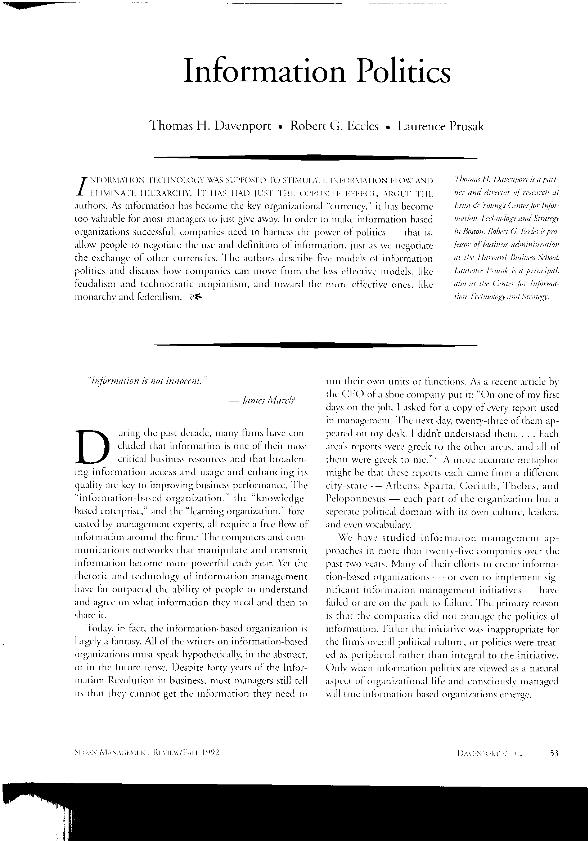Information politics

Contenido multimedia no disponible por derechos de autor o por acceso restringido. Contacte con la institución para más información.
| Tag | 1 | 2 | Value |
|---|---|---|---|
| LDR | 00000nab a2200000 i 4500 | ||
| 001 | MAP20071012022 | ||
| 003 | MAP | ||
| 005 | 20080418113141.0 | ||
| 007 | hzruuu---uuuu | ||
| 008 | 921204e19920923usa|||| | |00010|eng d | ||
| 040 | $aMAP$bspa | ||
| 084 | $a922.13 | ||
| 100 | 1 | $0MAPA20080261979$aDavenport, Thomas H. | |
| 245 | 1 | 0 | $aInformation politics$cThomas H. Davenport, Robert G. Eccles, Laurence Prusak |
| 520 | $aInformation technology was supposed to stimulate information flow and eliminate hierarchy. It has had just the opposite effect, argue the authors. As information has become the key organizational "currency", it has become too valuable for most managers to just give away. In order to make information-based organizations successful, companies need to harness the power of politics - that is, allow people to negotiate the use and definition of information, just as we negotiate the exchange of other currencies. The authors describe five models of information politics and discuss how companies can move from the less effective models, like feudalism and technocratic utopianism, and toward the more effective ones, like monarchy and federalism. | ||
| 650 | 1 | 1 | $0MAPA20080558888$aInformación |
| 650 | 1 | 1 | $0MAPA20080556709$aTecnología |
| 650 | 1 | 1 | $0MAPA20080606091$aEstrategia empresarial |
| 650 | 1 | 1 | $0MAPA20080546991$aEmpresas |
| 650 | 1 | 1 | $0MAPA20080598204$aPolítica empresarial |
| 700 | 1 | $0MAPA20080190644$aEccles, Robert G. | |
| 700 | 1 | $0MAPA20080175795$aPrusak, Laurence | |
| 740 | 0 | $aSloan management review | |
| 773 | 0 | $wMAP20077000185$tSloan management review$dBoulder$gFall 1992 ; p. 53-65 |

